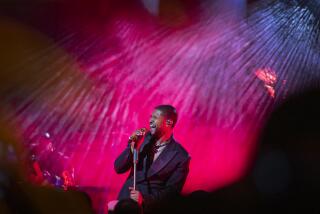Yes’ Newest Incarnation Takes Root : Music: The quintessential progressive British rockers perform tonight at the San Diego Sports Arena.
- Share via
SAN DIEGO — In an article about 15 years ago, well-known music critic John Mendelssohn challenged himself to summarize in a single word what he perceived as the worst traits of a then-popular if somewhat avant-garde sub-genre known as “progressive rock.” His answer: Yes.
Mendelssohn’s curare-dipped barb spoke volumes both about the sub-genre’s ability to polarize the rock audience, and about how prominently the British band Yes--the most popular and successful of the prog-rockers--figured in the equation.
Tonight at the San Diego Sports Arena, a new-old edition of Yes will present “Yesshows ‘91: Around the World in 80 Dates.” Vocalist Jon Anderson, guitarists Steve Howe and Trevor Rabin, keyboardists Rick Wakeman and Tony Kaye, drummers Bill Bruford and Alan White and bassist Chris Squire will perform as a group, in various ensembles and in solo segments. The apparent unwieldiness of this lineup begs explanation.
Since the mid-’70s, Yes has gone through periods of dormancy and realignment. Just last year, rival factions of Yes-men worked in separate bands--one under the old name, one under the legal-firm banner of Anderson, Bruford, Wakeman, Howe. Recently, however, members of both groups coalesced into a single unit to record an album aptly titled “Union.” It is this extended musical family that is now on tour, a fact that reopens the cases for and against Yes and the music it represents.
To understand why Yes’ re-formation is noteworthy, it is necessary to examine how the band came to exemplify a music that remains so divisive a force in the rock world.
The progressive rock of the early ‘70s was a river formed by many disparate tributaries. But if one were forced to pinpoint a watershed event that fed this new form, it was the 1967 release of the Beatles’ “Sgt. Pepper” album. By expanding the rock vocabulary to include non-linear thematic development, densely textured arrangements and production values and fantasy contexts, “Sgt. Pepper” encouraged a spurt of experimentation among such late-’60s artists as the Moody Blues, Jimi Hendrix, Cream and Procol Harum.
Up-and-coming bands such as Yes, Genesis, King Crimson, Gentle Giant and Emerson, Lake and Palmer featured trained, versatile musicians who were accustomed to diversity and thus more “evolved” than their ‘60s counterparts. To the pioneering efforts of their progressive predecessors, they added elements of jazz, classical and experimental music, as well as theater, to stretch this nascent form into still more rarefied directions. Thus, the progressive tag.
Of course, the term progressive itself invited derision; more so than in its political or even in its jazz applications, the word connoted a sophistication, an elitism that many found antithetical to the rock ethos. “Art rock,” its alternate appellation, was worse because it encouraged the argument about whether rock could, or even should, aspire to such lofty standards.
That issue drove a wedge between proggers and anti-proggers that has never been removed, even though progressive rock began to collapse under its own inflated weight in the mid-’70s. Punk, with its dogma of primitive minimalism, inflicted the final puncture wound when it raised its spiked head later in the decade.
Yes might have been the best-equipped of the above-mentioned acts to survive prog-rock’s demise. The band’s early albums, beginning with 1969’s self-titled effort, had enough raw rock ‘n’ roll energy to offset any rhythmic, harmonic and improvisational complexity. Although Yes raised the stakes with 1971’s ambitious, quasi-classical “Fragile” album, the effort produced a hit in the song “Roundabout,” which in turn boosted sales and made the quintet a major concert attraction.
Naturally, as the most successful and visible of the progressive bands, Yes became the obvious focus and easy target for anti-prog vilification. Undaunted, Yes threw down the gauntlet with 1972’s “Close to the Edge,” an eclectic maelstrom of roiling textures, multiple meters, grand melodies, cosmic-choir vocal arrangements and furious improvising that remains the group’s best studio effort.
Still, even after further pushing the envelope with increasingly challenging works, such as 1972’s sprawlingly enigmatic “Tales From Topographic Oceans” and 1974’s almost impenetrably dense-textured “Relayer,” and notwithstanding some fairly substantial personnel changes, Yes always conveyed the sense that it was a rock ‘n’ roll band capable of kicking out the jams, if so inclined.
After “Relayer,” Yes lost its creative fizz, and only die-hards noticed when various configurations of the band released a series of mostly uninspired albums in the late ‘70s. It wasn’t until South African-born newcomer Rabin engineered Yes’ transformation into a streamlined, contemporary band in 1982 that it attracted a new generation of fans and returned to record and concert viability.
On the strength of the hit singles “Owner of a Lonely Heart” and “Changes,” the album “90125” was a multiplatinum triumph, although some older Yes faithful grumbled about the band’s chart-courting sound. After the follow-up album, “Big Generator,” Yes went on another hiatus as its members pursued separate projects.
In 1989, Anderson gathered Bruford, Wakeman and Howe together for the recording that bore their names. Although “Anderson, Bruford, Wakeman, Howe” had its moments, it was soundly trounced in the rock press. The quartet’s subsequent tour brought them to San Diego State University’s Open Air Theatre.
While the group was working on its second release, Anderson traveled to Los Angeles and bumped into Rabin, who was working on a new album of his own. Meanwhile, Squire, White and Kaye were similarly engaged on an unrelated project. One thing led to another, and all parties agreed to combine their efforts. The result, “Union,” is a record that might be the best thing any Yes aggregate has produced since Mendelssohn made his damning play on the band’s name.
All the Yes hallmarks are accounted for: the aggressive melodies; the wide-ranging dynamics; Anderson’s cheery, chirping vocals; Howe’s discursive guitar lines; the struggle to balance rock roughness and neoclassical precision, and a free-form feel that disguises carefully designed structures.
In tonight’s show, Yes will perform on a revolving stage at mid-arena. At last word, tickets were selling well. Presumably, those critics not predisposed to such music (they easily outnumber those, like me, who are) are busily sharpening their skewers. Here we go again.
Yes will perform at 8 tonight at the San Diego Sports Arena. Tickets are $21.50. There is no opening act.
More to Read
The biggest entertainment stories
Get our big stories about Hollywood, film, television, music, arts, culture and more right in your inbox as soon as they publish.
You may occasionally receive promotional content from the Los Angeles Times.










